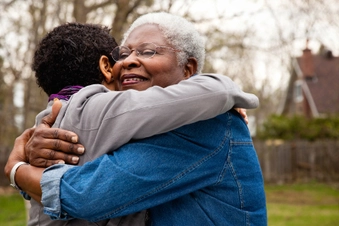Palliative Care for Women of Color with mBC

What Is Metastatic Breast Cancer Palliative Care?
Palliative care has a very important purpose: To ease all types of symptoms and help you enjoy life more. In fact, it’s a branch of medicine laser-focused on quality of life. It works hand in hand with your treatment. Though it doesn’t fight breast cancer itself, it does fight the emotional and physical side effects of cancer and cancer treatment through special types of support. It can even help you better understand your treatment options.

What Metastatic Breast Cancer Palliative Care Isn’t
Some people are afraid to ask about palliative care because they think it means end-of-life or hospice care. But hospice is only one type of palliative care. The aim of hospice is symptom relief in the last months of life. Palliative care services are for anyone at any stage of cancer. Experts suggest asking for them from day one of your diagnosis. But it’s never too late to start. Palliative care also doesn’t mean that you stop treatment. It’s delivered right alongside it.

Why You Must Advocate for Yourself
In 2016, the American Society of Clinical Oncology recommended everyone with advanced cancer get palliative care services at the same time as treatment. But studies show that less than 25% of people with metastatic breast cancer do, and that Black, Hispanic, and Asian/Pacific Islander women receive it far less often than White women. Don’t wait for your care team to bring up palliative care. Now that you’re learning about it, you can ask for it.

Who’s on a Palliative Care Team
Because palliative care can help with every aspect of metastatic breast cancer – including treatment options, goals, and symptoms – your palliative care team may have many members: a doctor, nurse, social worker, chaplain, mental health counselor, home health aides, pharmacist, nutritionist, and specialists from a physical therapist to music and art therapists. And they should spend as much time with you as you need.

When to Get Palliative Care
National Comprehensive Cancer Network guidelines say palliative care needs to be thought of as a key part of your treatment. And your unique palliative care needs should be addressed throughout that treatment. Tap into these services as soon as possible, no matter where you are in your metastatic breast cancer journey. As soon as you do, your symptoms can improve, your questions will be answered, and you’ll be better able to handle your diagnosis.

Finding Metastatic Breast Cancer Palliative Care
There are different ways to get started. Ask your oncologist for a meeting with a palliative care specialist. That’s a doctor who has extra training in how to manage symptoms and improve your quality of life. Ask your case manager for a patient navigator, an expert to help guide you through the medical system and get past barriers to care, including racial inequities. The Palliative Care Provider Directory is an online tool to help you find services in your area.

How Palliative Care Helps: Pain Relief
One of the biggest benefits of palliative care is pain relief. Pain causes a ripple effect that can lead to poor sleep, a hard time with your daily activities, a bad mood, and changes to your appetite. All of those can stop you from building strength and keeping a positive outlook. A pain specialist may be a key member of your team, especially if the cancer has spread to your bones.

How Palliative Care Helps: Other Physical Problems
Metastatic breast cancer treatment can also cause fatigue, constipation, shortness of breath, nausea, sexual health problems, and more. Palliative care can address these side effects. For instance, a registered dietitian nutritionist can craft a diet that will boost your energy and nutrient levels. And a sleep specialist can suggest ways to get the shut-eye you need to feel better.

How Palliative Care Helps: Your Emotions
You may feel stressed about medical appointments, nervous about the future, or depressed about your condition. You can get support to manage these very normal emotions so they don’t take over your life. Studies show that many women, especially Hispanic women with metastatic breast cancer, don’t try to get this kind of help. A mental health specialist can guide you through practices like meditation or activities like exercise, yoga, or art that can lessen your stress and anxiety.

How Palliative Care Helps: Social Support
It takes a network of support to manage life with metastatic breast cancer. But it may be hard for you to ask loved ones for the help you need. You may feel alone, and loved ones may not know exactly what to do. A palliative care social worker can help you find solutions to these challenges and explain how you and your family members can better support each other – and even how to have hard conversations about the future.

How Palliative Care Helps: Spiritual Support
No matter your religious or spiritual beliefs, spiritual palliative support can help you deal with the stress of metastatic breast cancer. Chaplains are spiritual care advisers who work with people from every background. Because of their special training, they can help you find purpose in your life when you have an uncertain future. Ask whether there’s a chaplain at the hospital where you get care.

How Palliative Care Helps: Practical Concerns
You might be surprised to learn that palliative care includes connecting you to resources to help to pay bills or lower the cost of your cancer drugs, handle insurance claims, and even get to and from doctor visits. A social worker or financial counselor can offer support in these areas and can be an important member of your care team.

How Palliative Care Helps: Older Adults
Any illness can take more of a toll on you the older you are. Metastatic breast cancer might not be the only medical condition you manage. Palliative care from a social worker can help you coordinate appointments with your different providers, manage what may be more serious treatment side effects, and hire home health care aides if you live alone. You might also benefit from a geriatric assessment (or evaluation), a screening test that pinpoints your specific needs.

How Palliative Care Helps: Your Loved Ones
Metastatic breast cancer also affects the people closest to you – your partner, your caregivers, and your children, no matter how old they are. Palliative care services can help them find the support they need to stay healthy and be able to support you. If you’re caring for young kids, a palliative care social worker can work with you to find after-school activities and other ways to help care for them.

Questions to Ask About Palliative Care
The first step to access palliative care is to ask your cancer doctor or nurse about the care options available to meet your needs:
- What palliative care services are available through your office or hospital?
- Can I get different services to help with different side effects of my current treatment?
- Can you connect me with palliative services other than what’s available through your office?
- Who are the palliative care experts I should have on my team?
- Will I get palliative care at your office, a clinic, a cancer treatment center, or at home?

Check Out Organizations for Women of Color
There are many orgs whose mission is getting resources for women of color at all stages of breast cancer. Here are just a few:
- African American Breast Cancer Alliance for metastatic breast cancer in Black women
- Alas-Wings for metastatic breast cancer in Hispanic women
- The Asian American Cancer Support Network for metastatic breast cancer in Asian women
Show Sources
IMAGES PROVIDED BY:
- E+ / Getty Images
- Corbis / Getty Images
- E+ / Getty Images
- E+ / Getty Images
- iStock / Getty Images
- Moment / Getty Images
- iStock / Getty Images
- E+ / Getty Images
- E+ / Getty Images
- DigitalVision / Getty Images
- iStock / Getty Images
- E+ / Getty Images
- E+ / Getty Images
- E+ / Getty Images
- E+ / Getty Images
- Moment / Getty Images
SOURCES:
Get Palliative Care: “Breast Cancer and Palliative Care,” “Palliative Care Provider Directory.”
Dr. Susan Love Research: “How Palliative Care Can Help,” “Research Worth Watching: A Look at Palliative Care.”
BreastCancer.org: “Black Women With Advanced-Stage Disease Less Likely to Get Certain Supportive Care Medicines Than White Women.”
CancerCare: “Palliative Care: What You Need to Know,” “Palliative Care Inches Toward Standard of Care.”
American Society of Clinical Oncology (ASCO): “ASCO Answers: Palliative Care,” “Types of Palliative and Supportive Care,” “Spiritual Support When You Have Cancer,” “Taking Care of Yourself At Home,” “What is a Geriatric Assessment?” “Breast Cancer – Metastatic: Palliative and Supportive Care.”
Journal of Clinical Oncology: “Integration of Palliative Care Into Standard Oncology Care: American Society of Clinical Oncology Clinical Practice Guideline Update.”
Breast Cancer Research and Treatment: “Palliative care utilization and racial and ethnic disparities among women with de novo metastatic breast cancer in the United States.”
Scientific Reports: “Palliative care and healthcare utilization among metastatic breast cancer patients in U.S. Hospitals.”
African American Breast Cancer Alliance: “Living Through Breast Cancer.”
American Association for Cancer Research: “Racial/Ethnic Minority Patients May Be Less Likely Than White Patients to Receive Palliative Care During Breast Cancer Treatment.”
Fred Hutch Cancer Center: “Palliative Care for Metastatic Breast Cancer.”
Am J Psychother., Nov. 2021.
American Cancer Society: “Questions to Ask About Palliative Care,” “Patient Navigators Can Help When Life Disrupts Cancer Care.”